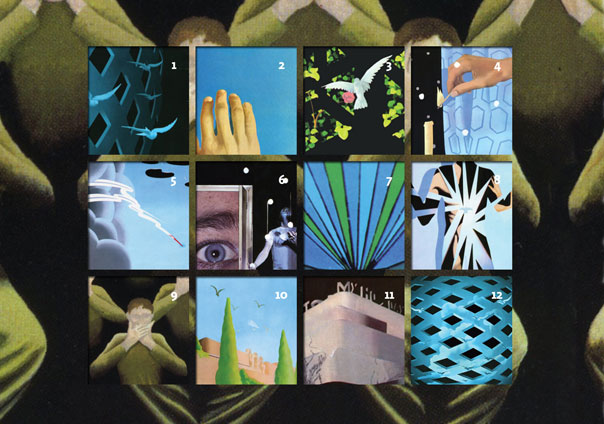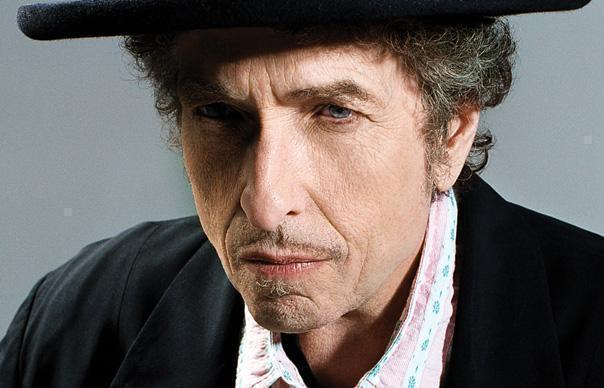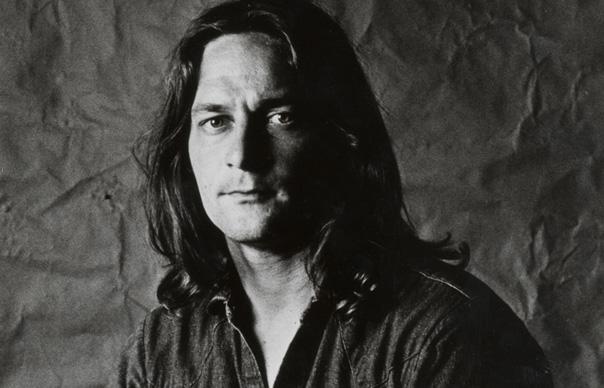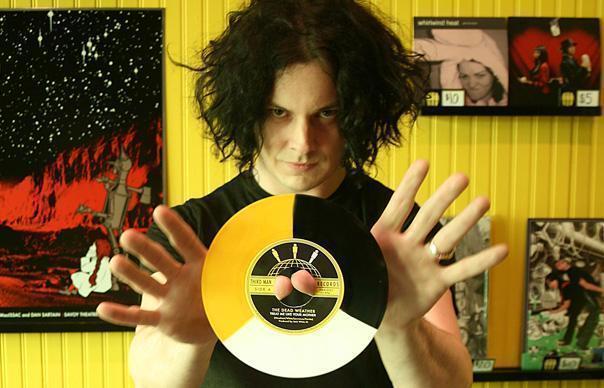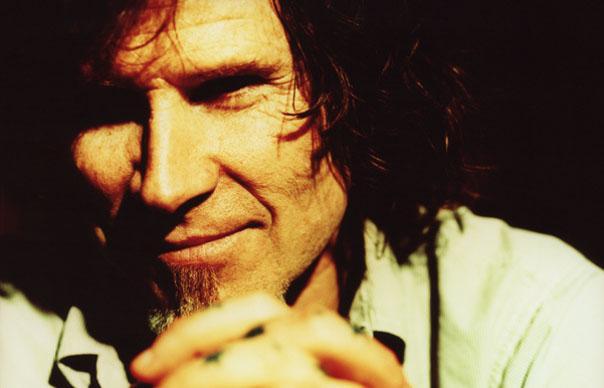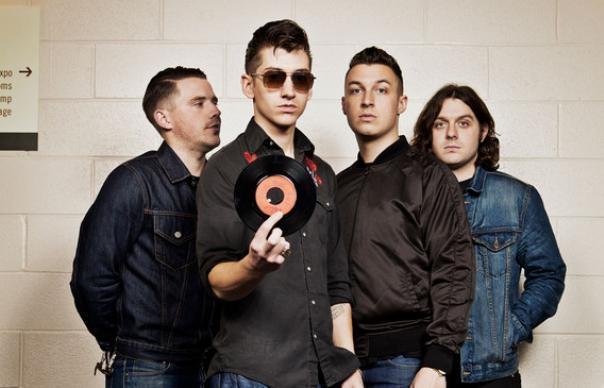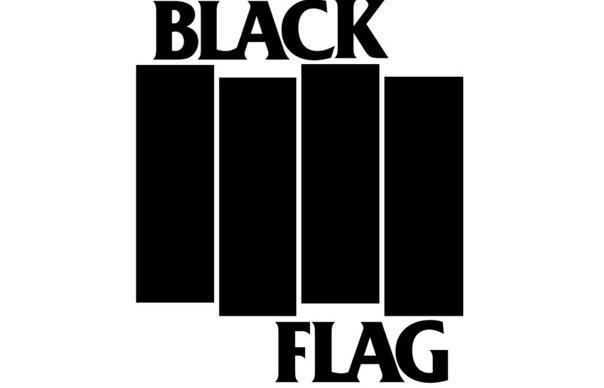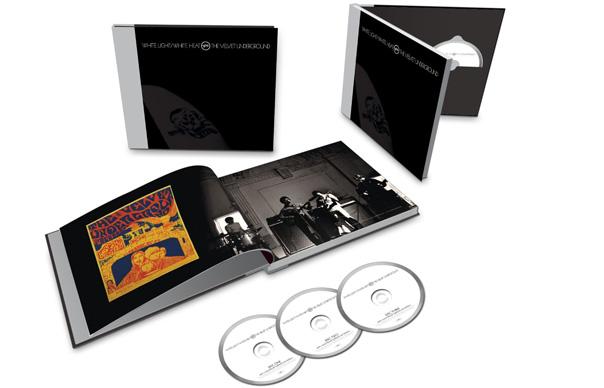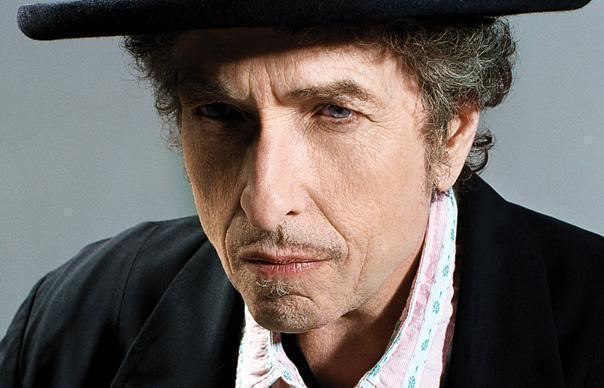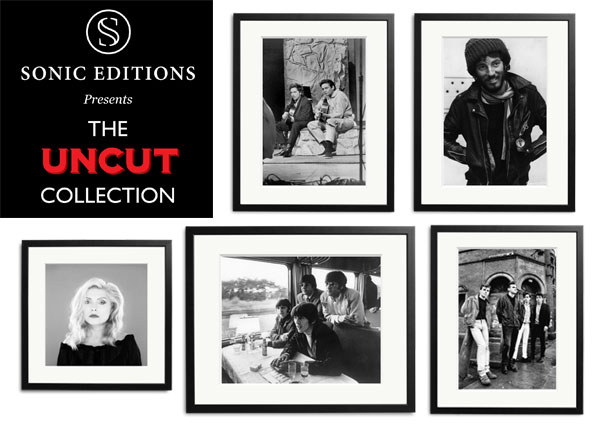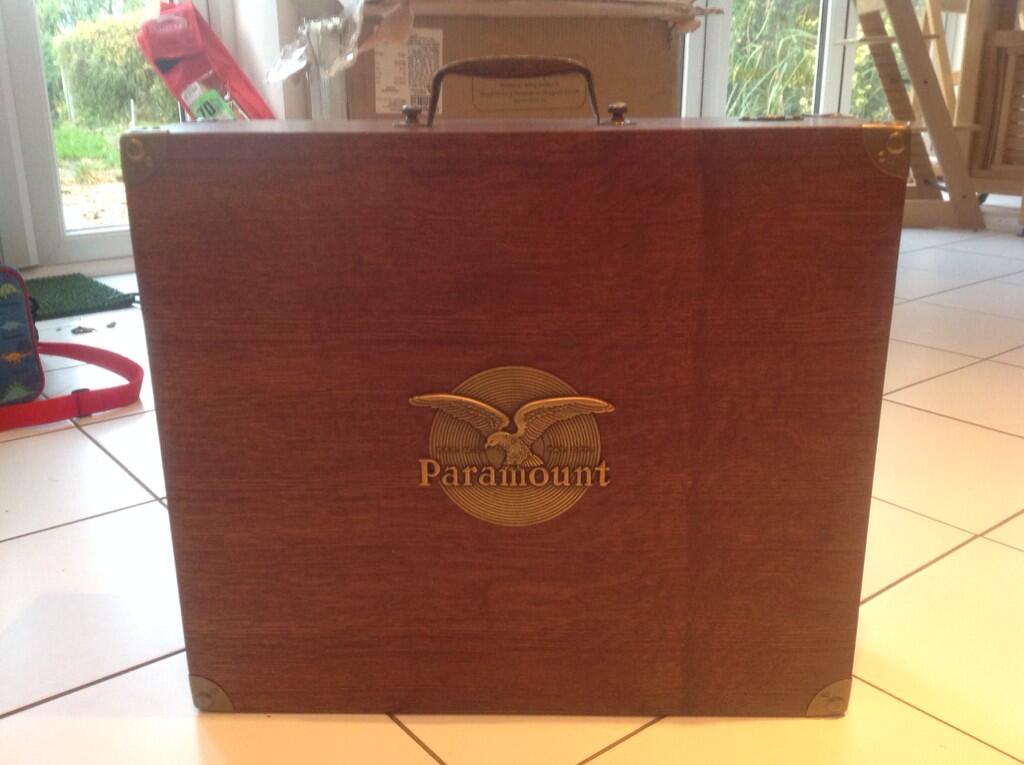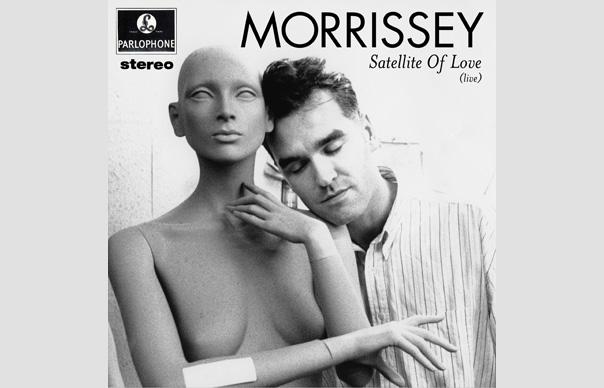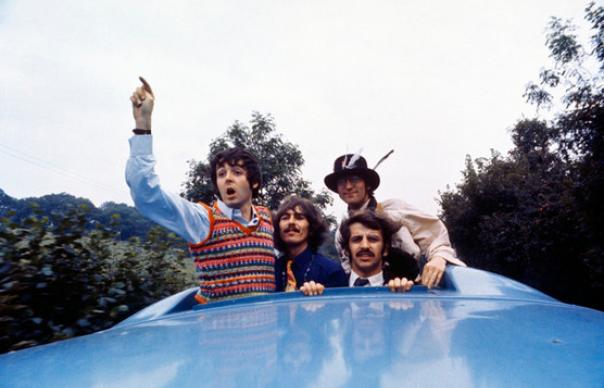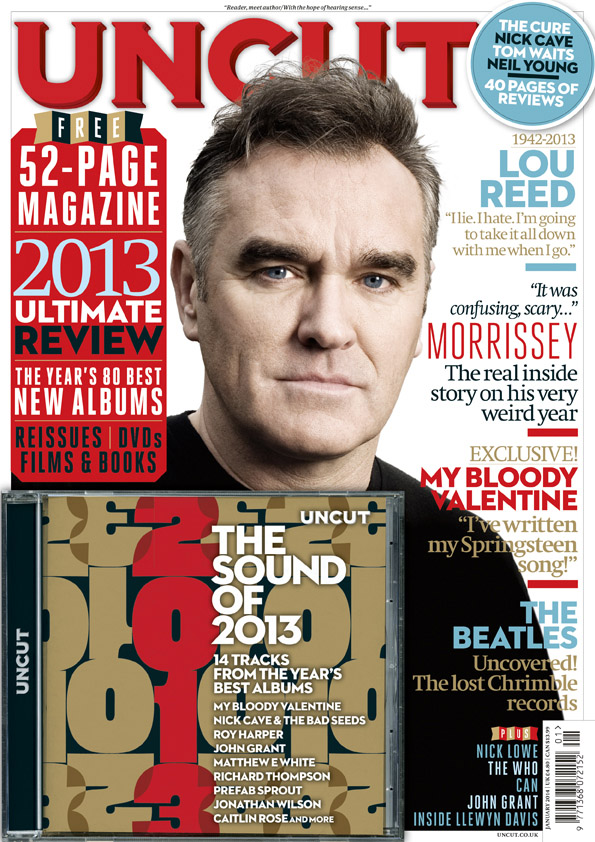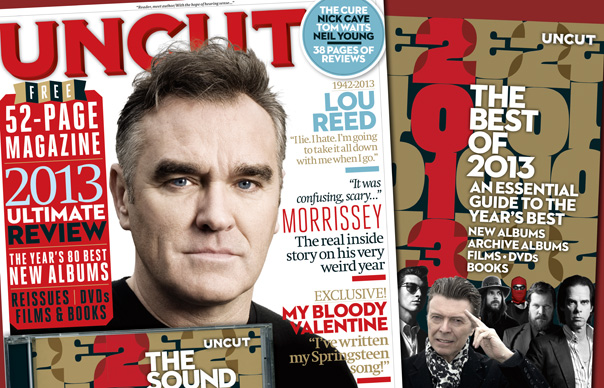As Mark Lanegan prepares to release a career-spanning compilation, Has God Seen My Shadow? An Anthology 1989-2011, early in 2014, we look back at March 2012’s Uncut (Take 178), where the Screaming Trees frontman and solo artist discusses the highs and lows of his catalogue, from collaborating with Kurt Cobain, attempting to thrown session tapes into a river and embracing the synthesizer. Interview: Alastair McKay
___________________
His reputation precedes him. Over a 25-year recording career that began with grunge godfathers Screaming Trees and has included collaborations with Kurt Cobain, Greg Dulli (ex-Afghan Whigs) and Queens Of The Stone Age, Mark Lanegan has established himself as an artist who prefers to walk on the shady side of the street. The pain he sings about isn’t an act: he’s wrestled with addiction, and tried the patience of several producers during an erratically brilliant solo career that continues with the release of the (relatively) upbeat Blues Funeral. On his solo recordings, he’s moved from confessional folk to ’80s-influenced gothic rock. So it’s a welcome surprise to find this tattooed giant in cheerful mood. “I’m very happy these days,” Lanegan says with a dry chuckle. “I’m a little less dark. Though I still hold a daily séance!”
___________________
SCREAMING TREES – BUZZ FACTORY
(SST, 1989)
The Trees journey from Ellensberg to Seattle, hone hard rock/psychedelic influences and tap into energy of grunge
Before we did that, we did an entire double album and nobody was happy with the way it sounded. I know that sounds expensive, but back then we made records for a thousand dollars, so it was two thousand to make that record. We made it in a week. But we didn’t like it. Right about then I also heard the first Mudhoney EP, “Superfuzz Bigmuff”. Hearing Mudhoney made me feel like we were total pussies, because when you hear the bass and the drums, everything’s out there. I said, “We gotta get the guy who did this to do our record.” It was Jack Endino. So we went to Seattle – I slept on the floor at my sister’s – and made it in four or five days. We used maybe one of the songs from the double album; they were all new songs. [Lead guitarist] Gary Lee Conner wrote excessively, he’d write two, three or four a day sometimes: fully formed songs. He was just a machine. And the one song that came from the double album we ended up leaving off the record! It still didn’t have the power of the Mudhoney EP but it was a lot closer to being representative of what we sounded like live. And that was our first experience of working with Jack – it was great.
MARK LANEGAN – THE WINDING SHEET
(Sub Pop, 1990)
Abortive Kurt Cobain collaboration leads to stark first solo outing
Me and Kurt Cobain were both listening to a bunch of Lead Belly and diggin’ it. We thought: let’s do an EP of all Lead Belly songs. We did a couple, and both of us were like, “Nah, this is a bad concept.” We set it aside. [Sub Pop label boss] Jon Poneman came in and said, “Shame you guys didn’t finish that record, why don’t you make a solo record?” I couldn’t play guitar, and had only written some words for the Trees – which consisted of taking words that were already written and changing some to make them have some semblance of personality. Jon told me what they would give me for making the record. I was working in a warehouse, and I thought, ‘You know what, I could fuckin’ quit that job and live high on the hog!’ I got a Mel Bay chord book, and at the end of the day when I was lowering my last conveyor belt of boxes I would come up with a melody. I would have it in my mind on the bus all the way home. I would get home and find the chords. I did it the first day that I tried, and I did it 10, 12 more times, and I also took one of the songs from Kurt and I’s session, “Where Did You Sleep Last Night?”. I mainly saw it through because of the financial inducements, but I’m glad I did.
MARK LANEGAN – WHISKEY FOR THE HOLY GHOST
(Sub Pop, 1994)
Modest attempt to write Astral Weeks turns into Fitzcarraldo
I had heard Astral Weeks, and heard how it was made. I thought, ‘I’m going to make a record like that: really fast.’ So I found a jazz bass player and went to do some songs. What I wanted to do in three days ended up taking almost three years, in many different studios with many different guys. Basically, I lost my mind. I would have it in my grasp, and then would see another possibility. That was the form of my illness. I couldn’t be nailed down. I continued to generate more material. I would mix stuff four or five times. And I’m talking about intricate sessions.
I had started this other record with Terry Date, who did the first Trees record on a major, then moved on to several other guys and finally got around to Jack Endino again. We were trying to mix a song that I thought would be easy – but on the second day I was trying to figure out why it wouldn’t move forward and be the way I wanted to hear it – this is two, three years into the making of that record… I was like, you know, “Fuck this!” There was a creek out back, I grabbed the tapes, I was actually walking through the yard and he grabbed a hold of me and said: “No fucking way am I going to let you do that.” I was like, “Dude, I’m over this, I need to get rid of it.” I realised it was making me crazier, and I wanted to be clear of it.
I was deep in addiction for the entire thing. I travelled the world that way. I went to my sister’s house for Christmas dinner that way. I thought about music this way: it’s something that I have to do. But it was really a means to an end. It facilitated my lifestyle. Which included a need for a lot of money on a daily basis. It was like Fitzcarraldo – it was like dragging a boat over a mountain. But that was something I was compelled to keep doing. Only because I love music. I could have, at any point, put that record out, and it would have been fine. But I was compelled: despite all the extraneous bullshit I was putting myself through, I wanted it to be great. And I couldn’t be satisfied that it was great even when it was finished. Or even today. I’m surprised it ever got finished really. But it came as a relief, to finally let it go.
SCREAMING TREES – DUST
(Epic, 1996)
Trees reluctantly embrace big rock sound on their final studio album
That was the last real record we made. It wasn’t an easy time, mainly because of band relations. Also my personal problems made it difficult to get anything done. We had already done the basics for a record [with Don Fleming] that couldn’t be finished. It was another year before we started this one. George Drakoulias had been one of the guys we’d talked about when we first started with Epic, and we were like “No!” We were paranoid about sounding good. Although I did want an update on the sound I was wary of sounding like Black Crowes, for instance, who George produced. So we went with Terry Date, who we knew. That was a good choice. But later, we were like, “Ach, you know, I wonder if that guy George is still available?” And he was. In that regard, it was a great experience. Benmont [Tench] from the Heartbreakers played on some of that stuff – he played two Mellotrons, one with each hand, at the same time. George was, still is, a great guy to be around. But my perception is that my personal stuff overruled everything, and I’m sure those guys would agree – it made everything difficult. Although I was trying to do my best, it was not to be!
QUEENS OF THE STONE AGE – SONGS FOR THE DEAF
(Interscope, 2002)
Collaboration with Josh Homme on Desert Sessions leads to full membership of QOTSA on album simulating a drive from Los Angeles to Joshua Tree
Josh had toured as guitarist with the Trees on Dust, so we knew each other really well. He actually asked me to be on the first Queens record, but that was not to be, because of my problems. I did some singing on the second one, and then started touring with those guys. In between that, I did the Desert Sessions [Volumes 7 & 8] which I only worked on
for a day because I was working on a solo record at the same time. And the best thing about that was meeting Alain [Johannes] – and the song that I did for that record, which Al and Josh wrote, “Hangin’ Tree”, ended up on the next one [Songs For The Death], so I just joined. My circle of friends, musician-wise, wasn’t huge. I only knew these certain guys. Working with Josh has always been so much fun. The result is serious, but the process is a lot of comedy. Writing lyrics with him is one of the funnest things that I do. I can’t really describe it but he’s a really funny guy, and when we work together, it’s a comedy, basically. You either laugh or cry, almost!
MARK LANEGAN BAND – BUBBLEGUM
(Beggars Banquet, 2004)
Confessional album, with a more rounded sound and collaborations with the likes of PJ Harvey
I always start from some personal place. Some are more fictional, some are more based on reality, but they all do start from something real. So in that way, it is confessional, but no more so than the rest of them. When we first convened I went MIA for the first month, which caused Chris Goss – who was trying to produce it – dismay. Then I came back and was so over-the-top involved that it caused him further dismay. I burnt him out and moved on to somebody else. There were a lot of the same behaviours as on Whiskey…, but in a more condensed time period. I distilled the qualities that had made me so much fun to work with before! The guy who mixed the stuff that Chris produced said I was like Russell Crowe in A Beautiful Mind. But it got done. Actually I enjoyed it. I just don’t know if the guys who were forced to work with me enjoyed it – I know some of them did not. But at the end I was pleased, because I didn’t want to make another dusty strings record. I wanted to make something that I might listen to, like Can or Kraftwerk.
ISOBEL CAMPBELL & MARK LANEGAN – BALLAD OF THE BROKEN SEAS
(V2, 2006)
Cast as Isobel Campbell’s bit-of-rough, Lanegan embraces his inner Lee Hazlewood
All the records I’ve made with Isobel are really special to me. That one in particular. I was a fan of Belle & Sebastian, but I was also a bigger fan of the Gentle Waves records she made. When she contacted me, I was thrilled. I guess she didn’t really know who I was, but she had heard my voice and thought I would do for something she was doing. But after we did this EP, “Ramblin’ Man”, we met in Glasgow and got along really well. I said, “I want to make a record together,” and she was like, “Yeah.” She immediately started sending me all these great songs. I was like: “Are you kidding? This is fantastic!” Basically I sang them in Los Angeles and sent them back to her. I had no idea it would last three records and six years or whatever. It was really cool, because that’s something that’s really unique to my personal experience: singing songs written by a woman, and just letting it go. Isobel’s a huge talent. Those were records I did not lose my mind on! I was able to just put myself in her hands.
THE GUTTER TWINS – SATURNALIA
(Sub Pop, 2008)
Lanegan and Greg Dulli explore the dark corners of their psyches
Working with Greg is a constant comedy. If you’ve seen Ishtar, the songwriting process is very similar to that. It’s two guys in a room making up the most inane stuff to make themselves laugh, then we’ll go, “Oh, that’s not bad,” but it probably is. That record was started six, seven years before it was finished. I had guested with The Twilight Singers, and Greg had played in my band. At Christmas time at the end of one of those tours we made up a couple of songs. For years people were going, “What’s going on with you and Dulli?” We got together at Christmas a couple of years later and did more. Years went by, and I had even said what the name of the band was, joking around, so we had to finish it. This project is light relief, even though the result sounds pretty heavy. When I heard it I was like, “Oh man, this is pretty dark stuff.” It reminded me of the Sly Stone record, There’s A Riot Goin’ On: it’s a party, but not a fun one. The record ended up with us in a better state than when we started it. It started on a very dark Christmas and ended on a lighter one. We started on drugs, we finished not.
MARK LANEGAN BAND – BLUES FUNERAL
(4AD, 2012)
Some ’80s-influenced sounds lend a poppy edge to typically chastening lyrics, but there’s no disguising Lanegan’s good humour
Usually I write on guitar. This time I bought a couple of drum machines and a synthesiser, an old Casio keyboard. When we started we sort of had the same thoughts as when we did Bubblegum. I did some things with Alain Johannes: the process dictated what the songs sounded like. I didn’t mind that we used drum machine, synthesiser, on Bubblegum, so it just seemed natural. I rarely play anything for anybody, but I played “Gray Goes Black” to my girlfriend, and she said, “I can’t believe you’re making something so happy sounding.” I said, “Happy sounding? [What about] the words?” She says, “No, it’s happy sounding.” That’s cool. I’ve always done whatever I felt reflected what was happening. In other words, I never really give it much thought, though in the past I may have been given over to morbid introspection. I listened back to the record in the car, and I thought it was great driving music. Greg Dulli was the first person I played it to; he said it sounded like Echo & The Bunnymen and Peter Gabriel. He thought it was more representative of where I’m at now. I agree.


